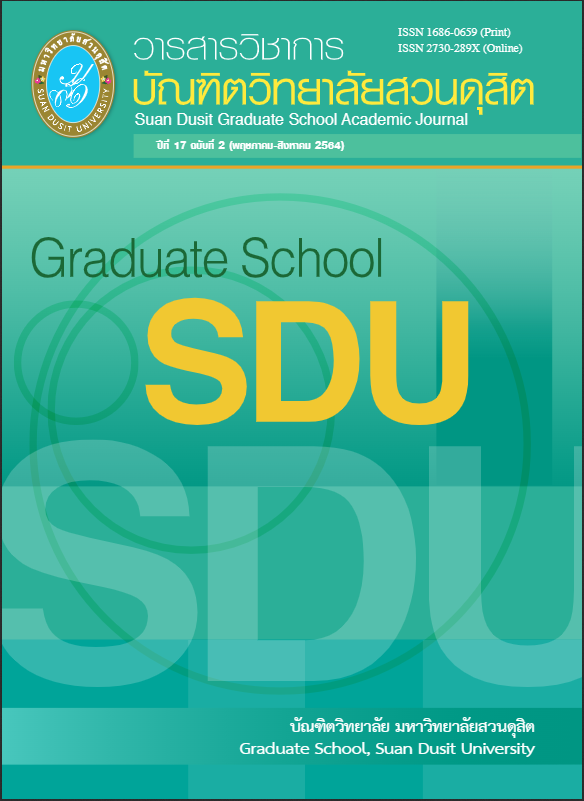The Factors Related to Entrepreneurial Intentions of Students Faculty of Business Administration and Liberal Arts of Rajamangala University of Technology Lanna Chiang Mai
Keywords:
Attitude toward Entrepreneurship, Social Norms, Perceived Self-efficacy Entrepreneurial IntentionAbstract
The objectives of this research were to study: 1) attitudes toward entrepreneurship, social norms, perceived self- efficacy and entrepreneurial intention of students of Faculty of Business Administration and Liberal Arts of Rajamangala University of Technology Lanna Chiang Mai. 2) factors related to entrepreneurial intention of students of Faculty of Business Administration and Liberal Arts of Rajamangala University of Technology Lanna Chiang Mai. The proportional stratified random sampling was used to select the sample of 230 students by calculating the proportion of students studying in the final year from each department. The questionnaire with the confidence level at 0.856 was used for data collection and the statistical analysis included frequency, percentage, standard deviation, and Pearson's Product Moment Correlation Coefficient. The results indicated that 1) the sample held overall attitudes toward entrepreneurship, social norms, perceived self-efficacy at the high level (x = 3.93, 3.65 and 3.45, respectively). In addition, the overall attitude toward entrepreneurial intention was at the middle level (X= 3.17). 2) these three factors were significantly correlated with entrepreneurial intention (p <0.01). Social norms were related to the entrepreneurial intention at the highest value (r= 0.495), followed by the attitude toward entrepreneurship (r = 0.299) and perceived self-efficacy (r = 0.025). These factors had a positive relationship with the entrepreneurial intention which was consistent with the research assumptions.
References
Bandura, A. (1997). Social Cognitive Development: Frontiers and Possible Futures. Cambridge: Cambridge University.
Carsrud, A. L. & Krueger, N. F. (2010). Entrepreneurial Intentions: Applying the Theory of Planned Behavior. Entrepreneurship & Regional Development, 5 (4): 315-330.
Ferreira, J. J., Raposo, M. L., Gouveia Rodrigues, R., Dinis, A. & do Paco, A. (2012). A Model of Entrepreneurial Intention: An Application of the Psychological and Behavioral Approaches. Journal of Small Business and Enterprise Development, 19 (3): 424-440.
Gurel, E., Altinay, L. & Daniele, R. (2010). Tourism Students' Entrepreneurial Intentions. Annals of Tourism Research, 37 (3): 646-669.
Heuer, A. & Linan, F. (2013). Testing Alternative Measures of Subjective Norms in Entrepreneurial Intention Models. International Journal of Entrepreneurship and Small Business, 19 (1): 35-50.
Krueger, N. F., Reilly, M. D. & Carsrud, A. L. (2000). Competing Models of Entrepreneurial Intentions. Journal of Business Venturing, 15 (5): 411-432.
Leelathum, M. (2018). Inspirational Business. [Online]. Available: http://www.bangkeknews/bangkokbiznews.com. [2018, September 281.
Linan, F. & Chen, Y. W. (2009). Development and Cross-cultural Application of A Specific Instrument to Measure Entrepreneurial Intentions. Entrepreneurship Theory and Practice, 33 (3): 593-617.
Linan, F. & Rodriguez-Cohard, J. C. (2015). Assessing the Stability of Graduates' Entrepreneurial Intention and Exploring Its Predictive Capacity. Academia Revista Latinoamericana de Administration, 28 (1): 77-98.
Linan, F., Nabi, G. & Krueger, N. (2013). British and Spanish Entrepreneurial Intentions: A Com-parative Study. Revista de Economia Mundial, 33: 73-103.
Lohawattanakul, S. (2018). Re-Investing SME Future. [Online]. Available: https://bangkok-today.com/web. [2018, September 8].
Mekara, M. (2003). Factors Predicting Entrepreneurial Intentions of Chiang Mai University Students. Independent Study: Master of Science (Industrial and Organization Psychology), Graduate School Chiang Mai University.
Moungmee, P. (2012). Psycho-social Factors Associated with Entrepreneurial Intention of the Fourth Year Thammasat University Students. Journal of Behavioral Science for Development, 4 (1): 74-82.
Nithikitsookkasem, P. & Wingwon, B. (2018). Model Entrepreneurial Intentions of Students Vocational in Education for Enterprise Incubator Project. Journal of Business Administration The Association of Private Higher Education Institutions of Thailand, 7 (1): 146-147.
Ogundipe, S. E., Kosile, B. A., Olaleye, V. I. & Ogundipe, L. O. (2012). Entrepreneurial Intention Among Business and Counselling Students in Lagos State University Sandwich Programme. Journal of Education and Practice, 3 (14): 64-72.
Triprobsakul, S. (2015). The Study of Entrepreneurship Motivation on Business Growth and Business Growth Expectation: A Case Study of Thailand. Suthiparithat Journal, 29 (90): 75-93.
Triprobsakul, S. & Pichyangkul, C. (2018). Factors Influencing Youth Entrepreneurs in Thailand. NIDA Business Journal, (22): 44.
Waiwanichayakul, N. & Udomsri, C. (2005). Research Methodology in Business. Bangkok: Chulalongkorn University.
Yensawadsdi, W. (n.d.). Ten Attributes of The Best Entrepreneurs. [Online]. Available: https://www.Softbankthai.com/Article/Detail/863. [2017, May 17].
Yothongyos, M. & Sukmaungma, S. (2016). Factors Affecting Entrepreneurial Intention of Undergrad Students: A Case Study of Bangkok University. Suthiparithat Journal, 30 (95): 104.
Downloads
Published
How to Cite
Issue
Section
License
Copyright (c) 2021 Suan Dusit Graduate School Acadamic Journal

This work is licensed under a Creative Commons Attribution-NonCommercial-NoDerivatives 4.0 International License.






